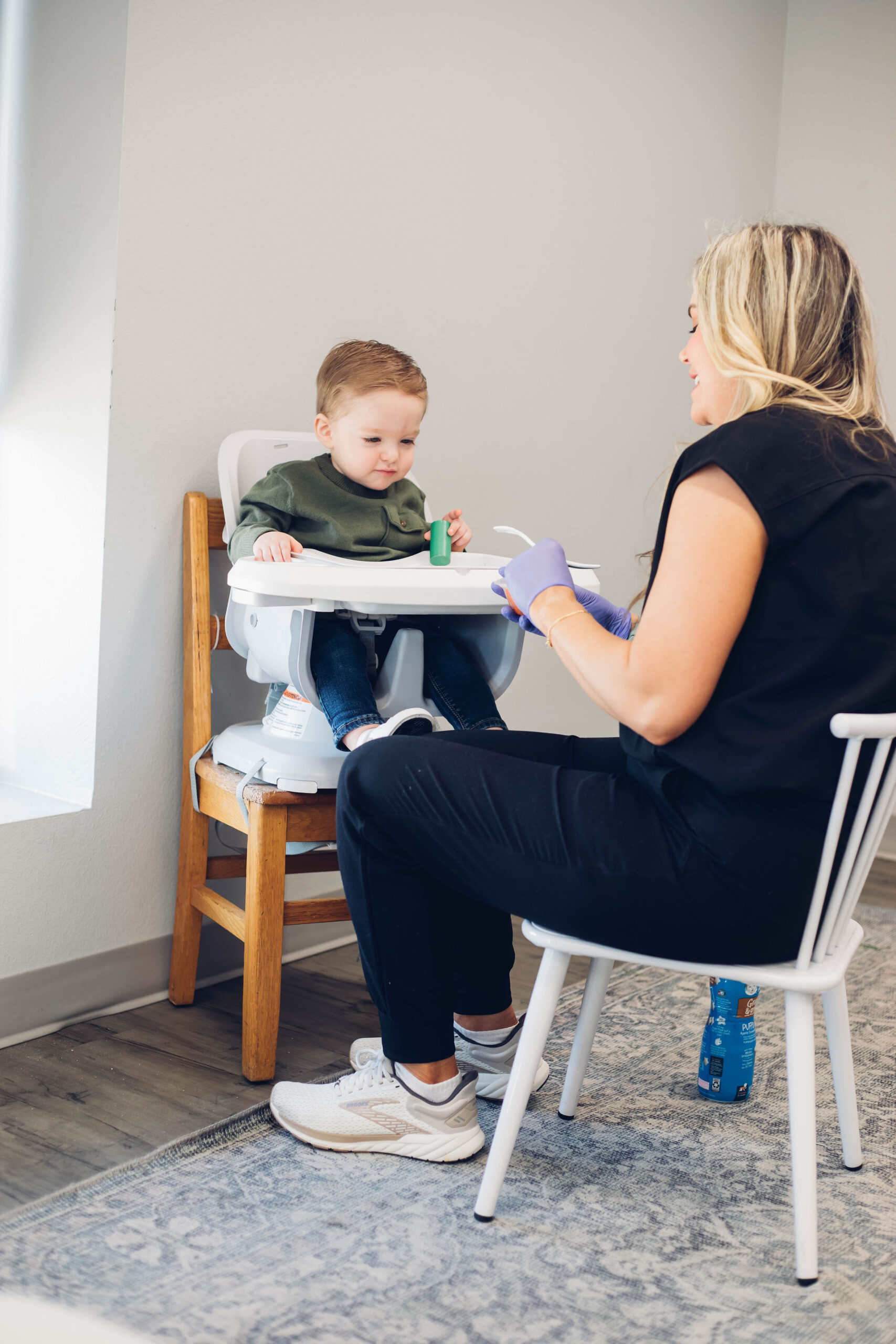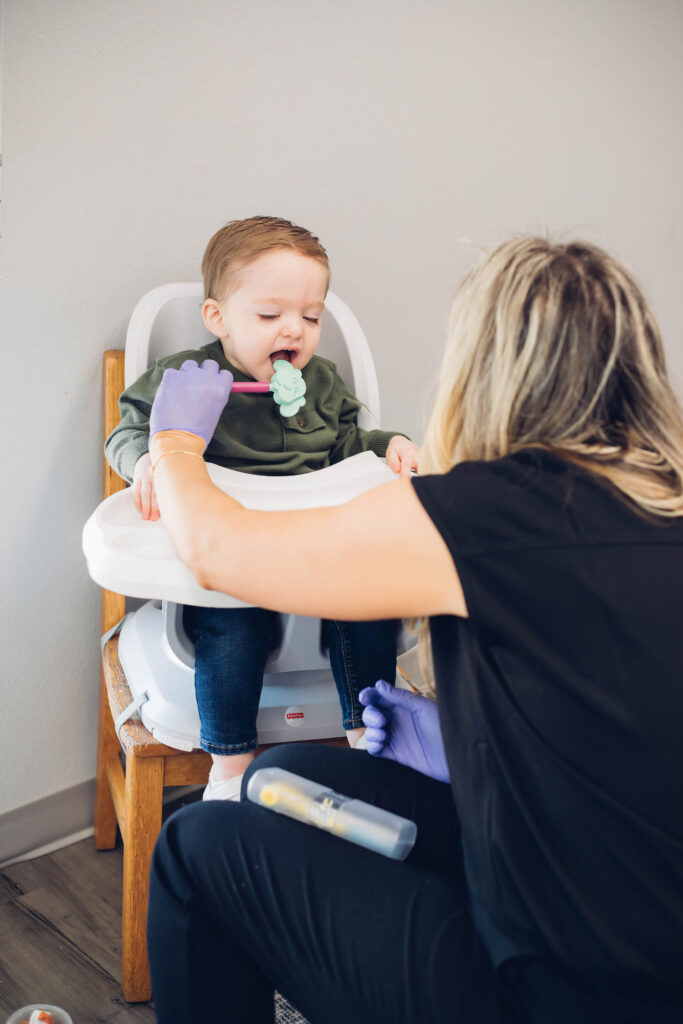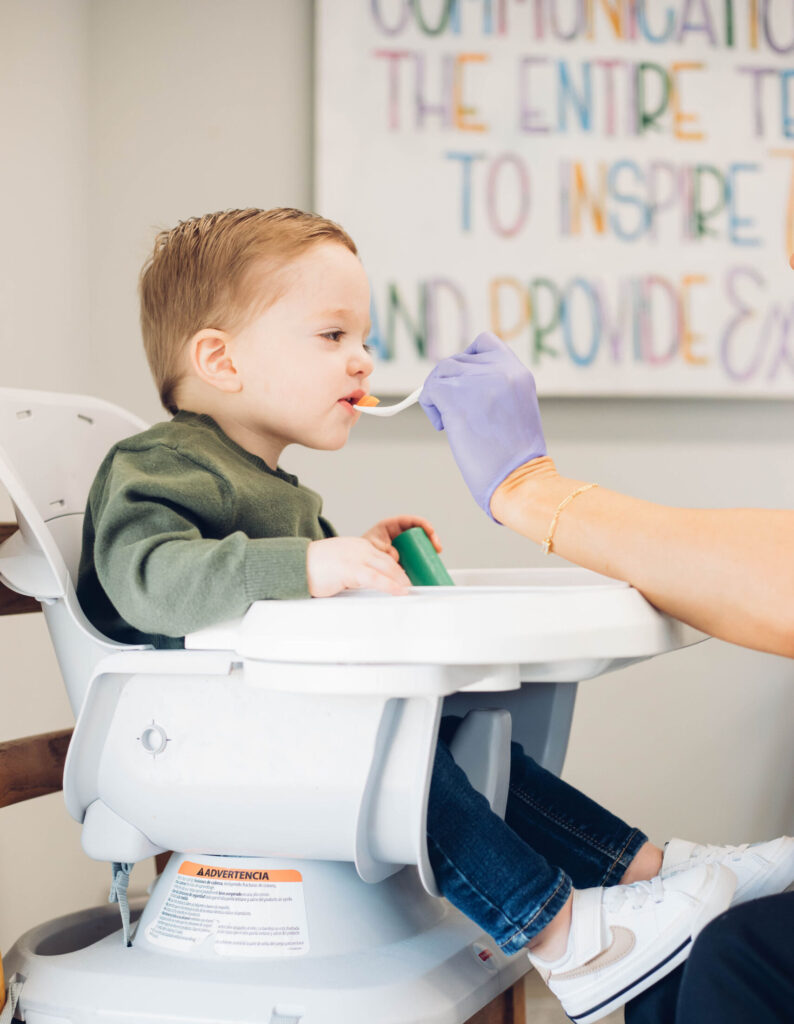
The common saying of parents everywhere is, “You need to eat all your vegetables, so you grow big and strong!” Well, what can you do if your child struggles with nursing or eating solid foods beyond the typical fussiness expected in childhood?
If your child struggles with eating, they might not be getting enough nutrients for healthy development. This can impact their health long-term and cause them to develop a negative relationship with food. The good news is our feeding therapists at Pediatric Therapy Partners are experienced in handling feeding difficulties in infants, babies, toddlers, and young children. We can evaluate the causes and develop a treatment plan to make mealtime relaxing again!
Does My Child Need Feeding Therapy?

Your child’s pediatrician should update you at every checkup on how well your child is growing. If they’ve indicated that your child is underweight, you should talk to them about any feeding struggles your child is having and ask about feeding therapy.
You can also call us at (318) 746-1199 and ask about our free developmental screening. Our therapists will be happy to go over your child’s difficulties and advise you if feeding therapy can benefit them.
The following are signs that your child may need feeding therapy:
- Your infant struggles to latch to the breast or bottle.
- Babies have difficulty swallowing when nursing or moving to solids.
- They have a cleft lip or palate.
- They have a condition like Down syndrome or cerebral palsy that affects their fine or oral motor skills.
- They struggle with certain types of food due to texture, color, temperature, or other sensory reasons.
- They have difficulty using utensils or cups.
- Your baby has a tongue or lip tie.
What Is a Feeding Therapy Session Like?
While all the therapy services we provide include parents or guardians, in feeding therapy it is especially important that you participate as well. This is because our therapists are professionals — we know that we can help your child nurse or eat. What’s important is that you learn the tricks and techniques that will help your child at home while they’re developing the skills to eat on their own.
Of course, it wouldn’t be feeding therapy without food! After your child’s evaluation, our therapists will let you know what types of food you will need to bring to the therapy sessions. Practice makes perfect, so your child will have the opportunity to practice eating different foods during their sessions. Like all of our therapy services, feeding therapy is designed to feel like play and keep your child engaged. With lots of support and encouragement, your child will improve their feeding skills and improve their confidence about mealtimes!

How Do I Schedule a Feeding Therapy Evaluation?

Our pediatric feeding therapists will need a referral from your child’s pediatrician to evaluate and treat your child. If you don’t have one, don’t worry! Our staff can help coordinate this and get you a referral so your child can receive treatment.
When you’re ready to make an appointment for your child, call our office at (318) 746-1199 to speak to our Intake Coordinator. She will be able to answer your questions, and she will send you an email with online forms to fill out.
Once you have completely filled out the forms, including your insurance information, our Intake Coordinator will contact you to schedule your child’s initial evaluation appointment and go over any other important details with you.
Ready to get started? Call us at (318) 746-1199 today!
THE BEST!!!!!!! These girls are AMAZING and truly care!! My son has been in OT for sensory and feeding development for a few months. I’m blown away!!!!!! He went from only eating chicken nuggets, hot dogs, and peanut butter to trying a new food EVERY WEEK! He will now eat carrots, new fruits, grilled cheese, turkey, cheeseburgers, pizza, sauce (has never been willing to even try) and so much more! We are SO thankful for PTP!
My daughter, Madeline, loves going to Pediatric Therapy Partners. I can tell they really care about the kids they help. No matter what therapist she sees, I know I don’t have to worry about the care she receives. I highly recommend them.
Pediatric Feeding Therapy Frequently Asked Questions
At what age should my child start feeding therapy?
Feeding therapy is designed to support children who have difficulties with eating, swallowing, and mealtime behaviors. The ideal age for a child to start feeding therapy can vary depending on their individual challenges and developmental stage. Some children might benefit from early intervention, starting as young as infancy. Signs such as trouble breastfeeding or transitioning to solid foods can prompt the consideration of feeding therapy. For others, starting feeding therapy during the toddler or preschool years can also be effective.
If you notice your child struggling with accepting different textures, refusing certain foods, choking frequently, or having difficulty coordinating their mouth movements during eating, it’s a good idea to consult a healthcare professional or a feeding therapist. They can assess your child’s eating behaviors and recommend whether early intervention is helpful.
What are the signs my child may require feeding therapy?
Your child may be a good candidate for feeding therapy if you notice any of these signs:
- Texture Aversions: If your child consistently avoids certain textures of food, gags, or shows discomfort when trying new foods, it might signal a need for feeding therapy.
- Limited Food Choices: If your child has a very restricted range of foods they’re willing to eat, and this is affecting their nutrition or mealtime experiences, feeding therapy could offer support.
- Mealtime Struggles: If your child displays behaviors like tantrums, refusal to sit at the table, or extreme anxiety during mealtimes, feeding therapy might be beneficial.
- Swallowing Difficulties: If your child frequently coughs, chokes, or shows signs of discomfort while eating or drinking, it’s essential to consider feeding therapy to address potential swallowing challenges.
- Slow Weight Gain or Growth: If your child’s growth rate or weight gain is slower than expected, it could be linked to eating challenges that feeding therapy can help address.
- Transitioning Issues: If your child has trouble transitioning from breastfeeding or bottle-feeding to solid foods, or if they struggle to advance to age-appropriate textures, feeding therapy could provide valuable assistance.
If you observe these signs and have concerns about your child’s eating habits or nutrition, consult with a healthcare professional or a feeding therapist. They can help you determine if feeding therapy is a suitable path to ensure your child’s healthy eating and mealtime success.
What are the rewards of pediatric feeding therapy?
Pediatric feeding therapy offers a range of rewards that can positively impact both children and their families. Some of the key benefits include:
- Improved Nutrition: Feeding therapy helps children expand their food choices and develop healthier eating habits, ensuring they receive the necessary nutrients for growth and development.
- Enhanced Mealtime Experiences: Children who once struggled with mealtimes can learn to enjoy a wider variety of foods, making family dinners and social gatherings more enjoyable for everyone.
- Reduced Stress: Feeding therapy can alleviate stress and anxiety around mealtime, as children become more comfortable with different textures, flavors, and eating environments.
- Boosted Confidence: As children overcome feeding challenges, their confidence and self-esteem grow, enabling them to explore new foods with enthusiasm.
- Improved Growth and Development: By addressing feeding difficulties early, children can achieve healthy growth and reach developmental milestones more effectively.
- Enhanced Family Bonding: Parents and caregivers often learn valuable techniques through feeding therapy, fostering stronger connections with their children during mealtime interactions.
- Enhanced Social Interaction: Improved eating skills can enhance a child’s ability to eat comfortably and confidently in social settings, promoting positive interactions with peers.
- Improved Lifestyle: Successful feeding therapy can set the stage for a lifetime of healthier eating habits and well-being.
The rewards of pediatric feeding therapy extend beyond the dining table, impacting children’s overall quality of life and development. Consulting with feeding therapists can help families understand how feeding therapy can support their child’s growth, nutrition, and positive mealtime experiences.
Will my insurance cover pediatric feeding therapy?
Navigating insurance coverage for pediatric feeding therapy can vary based on individual insurance plans and circumstances. Many insurance plans do offer coverage for pediatric feeding therapy, but the extent of coverage can differ widely. Contact your insurance provider to understand the specifics of your plan and whether feeding therapy falls under its coverage.
Factors that can influence coverage include the nature of your child’s feeding challenges, the necessity of therapy, and the terms outlined in your insurance policy. Some plans may require a doctor’s referral or documentation of medical necessity to approve coverage for feeding therapy. If you have questions about insurance coverage—or if your coverage is insufficient—speak with your doctor or the feeding therapy clinic you’re considering, so you can understand your options and make informed decisions for your child’s well-being.
What role does the parent occupy during pediatric feeding therapy?
Parents play an essential and active role during pediatric feeding therapy, creating a collaborative and supportive environment for their child’s progress. Here’s how parents contribute:
- Taking a Team Approach: Parents and feeding therapists work together as a team to address a child’s feeding challenges. This partnership allows therapists to create personalized strategies that align with the child’s needs and the family’s goals.
- Providing Observation and Insights: Parents provide valuable insights into their child’s eating habits, preferences, and behaviors at home. This information helps therapists tailor therapy plans and interventions more effectively.
- Implementing Techniques: Feeding therapists equip parents with techniques and strategies to use during meals and snacks at home. These techniques help support the child’s progress between therapy sessions.
- Creating a Positive Environment: Parents can help create a comfortable and positive mealtime environment that encourages exploration of new foods and reduces stress or anxiety around eating.
- Providing Encouragement and Support: Parents offer encouragement, praise, and emotional support to their child during feeding therapy. This positive reinforcement reinforces the child’s confidence and motivation to try new foods.
- Supporting Consistency: Implementing strategies consistently at home helps reinforce what the child learns during therapy sessions, enhancing the overall effectiveness of the therapy.
Parental involvement is vital for successful outcomes in pediatric feeding therapy. By actively participating, parents contribute to their child’s growth, development, and ability to build healthier eating habits. Collaborating with feeding therapists, parents become empowered advocates for their child’s well-being and progress in overcoming feeding challenges.
